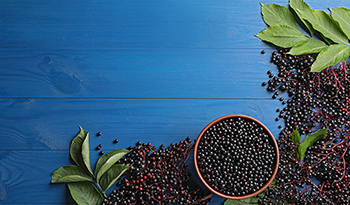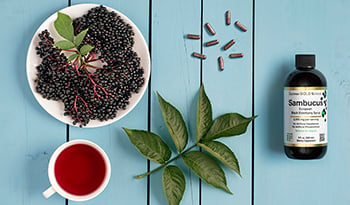5 Natural Ways to Strengthen Immunity for Cold and Flu Season

As the seasons change and holiday plans are made, you may also be taking inventory of your medicine cabinet, sifting through the remnants of last year’s cold and flu season.
However, the best ways to strengthen your immune health are often found elsewhere. Sure, it's good to have remedies on hand in case you or a loved one gets sick, but the best preparation for cold and flu season is prevention.
Is Poor Immunity a Thing?
Absolutely! There are many reasons why someone may have a poorly functioning immune system.
Your immune system helps protect the body from disease and infection with a complex network of organs, tissues, and cells. The major players in the immune system include the lymphatic system, the spleen, white blood cells, the thymus, antibodies, bone marrow, and the complement system. Together, they defend your body from disease-causing germs like fungi, parasites, viruses, and bacteria. The immune system also identifies and neutralizes substances from the environment that are harmful, in addition to battling disease processes such as the formation of cancer cells.
Causes of Poor Immunity May Include:
- Poor nutrition
- Smoking
- Drinking alcohol
- Stress
- Lack of sleep
- HIV/AIDS
- Immunosuppressive medications
- Primary Immune Deficiency (being born with a weak immune system)
- Obesity
- Aging
Signs of Poor Immune Function
If your immune system is operating at a suboptimal level, you can experience a variety of signs and symptoms. Not everyone with poor immune function will have the same symptoms, and many people will not exhibit any symptoms.
Poor Immune Function Signs May Include:
- Frequent illness
- Fatigue
- Repeated infections
- Digestive trouble
- Slow-healing wounds
How to Strengthen Your Immune Health for Cold and Flu Season
There are several ways you can maintain immune health naturally to support your body's innate ability to protect against illness, as well as minimize the severity of symptoms should you fall ill.
1. Manage Your Stress to Mitigate Immune Suppression
Experiencing long term stress can take a toll on your immune system. Chronic stress elevates your cortisol and adrenaline hormones. Excess amounts of these stress hormones can cause increased blood pressure, elevated blood sugar, and decreased digestive ability. These reactions to increased cortisol and adrenaline can eventually lead to heart disease, gut dysfunction, diabetes, and autoimmune disease.
Mindfulness is a practice that can help calm the mind and body and is a useful coping mechanism in managing both actual and perceived stressors in your life. Mindfulness is the act of being present in the moment, not focused on the past, not worried about the future, just living in the moment that has presented itself to you.
For example, consider the thoughts you may have as you’re walking your dog. Are you thinking of a disappointing failure (focused on the past), what your dinner options are for tonight (worried about the future), or enjoying the cool breeze, fresh air, and the sun on your face (practicing mindfulness)?
Other healthy ways to cope with feelings of stress include talking to someone objective like a trusted mentor or therapist, taking a yoga class, meditating, and prioritizing self-care.
Some supplements may help you feel more balanced and less stressed. Adaptogen herbs help balance hormones and restore normal function in the body.
Ashwagandha is an adaptogen herbal supplement that may help reduce cortisol levels, stress, and anxiety. Also known as Indian Winter Cherry, ashwagandha is a prominent herb in Ayurveda, the traditional medical system of India originating more than 3,000 years ago.
2. Get Enough Sleep to Support Immunity
Fewer hours and poor quality of sleep are associated with increased rates of illness and likeliness to catch a cold. Lack of sleep can also lengthen your illness with a longer recovery time. Severe sleep loss appears to have a similar effect on the body as exposure to stress.
When you are sleep deprived, your inflammatory cells go up, and your immune fighting T-cells go down. Over time, these cellular changes may lead to an increased risk of catching a cold or flu.
It is recommended that adults get at least seven hours of sleep every night. Teens need more sleep, with a recommendation of 8-10 hours. Younger children can need even more; up to 14 hours are recommended for small children and infants.
These tips will help you sleep better, improving your immune health while you snooze:
- Turn the devices off at least one hour before bedtime
- Go to bed at the same time every night
- Expose yourself to bright light or sunlight during the day
- Reduce caffeine, especially later in the day
- If you must nap, make it 30 minutes or less
- Avoid drinking alcohol
- Avoid eating large meals before bed
- Take a bath or shower just before bedtime
- Exercise in the morning or early afternoon
- Don’t drink fluids within two hours of going to sleep
- Treat yourself to nice bedding, a good pillow, and a great mattress
- Listen to guided meditations on your favorite app to help you fall asleep peacefully
Certain supplements are known to help with sleeping difficulties. Melatonin and valerian root are two supplements worth exploring for natural sleep support.
3. Move Your Body to Boost Immunity
Exercise is a natural way to support many body functions and systems, including immunity.
Moderate exercise is recommended to maintain immune function; however, intense and heavy exercise seems to do more harm than good.
Examples of moderate exercise include:
- Working out at the gym 3-4 times a week
- Briskly walking two miles in 30 minutes
- Water aerobics for 30 minutes
- Riding your bike five miles in 30 minutes
- Playing tennis
- Hiking
- Jumping rope for 15 minutes
- Swimming for 20 minutes
- Dancing for 30 minutes
Exercise is thought to help balance immunity in the following ways:
- Slowed release of stress hormones which may help boost the immune system
- Increased body temperature may help prevent bacteria from growing
- Immune cells circulate faster meaning they can detect infection earlier
- Increased breathing during exercise may help flush illness out of the lungs
4. Eating Nutrient-Dense Foods is Key to Immunity
Eating a diet rich in vitamins and minerals may be the most important piece to your healthy immune system puzzle.
Plant-based foods provide most of the nutrients needed by the immune cells for them to function optimally and protect your body against disease.
Nutrient-dense foods that are great for supporting the immune system include:
- Anti-inflammatory foods like olive oil, mackerel, salmon, turmeric, flax seeds, and chia seeds
- Fermented foods high in probiotics like sauerkraut, kefir, natto, and kimchi
- High vitamin C foods including lemons, limes, grapefruits, red bell peppers, spinach, papaya, and oranges
- Foods rich in antioxidants including broccoli, green tea, blueberries, dark chocolate, beans, artichokes, and goji berries
- Foods high in vitamin E like almonds, sunflower seeds, spinach, hazelnuts, and peanuts
- Zinc-rich foods like oysters, crab, mussels, lobster, beans, and nuts
Limiting your sugar intake and refined carbohydrates can also have positive effects on your immune health. Added sugars contribute to immune-suppressing conditions including inflammation, diabetes, heart disease, and obesity.
Staying hydrated is critical to your overall health. Dehydration can hinder your kidney, heart, and digestive function, which increases your risk of illness. Drink when you are thirsty and enough to make your urine light yellow in color.
5. Supplement with Vitamins, Minerals, and Immune Boosting Botanicals
If you are like many adults, there’s a good chance you do not eat the recommended servings of at least two cups of fruit and three cups of vegetables every day.
While increasing plant-based foods is the best solution, supplements can help bridge the gap just in case you fall short.
Vitamins and minerals your immune system needs that can be supplemented include:
- Zinc – Supplementation has shown a 33% reduction in the duration of a cold. Zinc is also critical for the normal functioning of immune cells, especially neutrophils, macrophages, and Natural Killer cells.
- Vitamin C – Supplementation has been shown to lessen cold duration by 8%. Vitamin C helps various immune cells to perform their tasks properly, including T-cells and phagocytes.
- Vitamin D – Low vitamin D levels are associated with both overactive (autoimmune disease) and underactive (frequent infections) immune system function. Vitamin D can help balance the immune system during cold and flu season.
Botanical supplements are also beneficial to immune health with their antiviral and antibacterial properties. These immune-strengthening botanicals should be in your medicine cabinet this cold and flu season:
- Garlic – Taking garlic supplements has been shown to reduce the incidence of the cold by approximately 30%. Garlic has antiviral, antifungal, and antibacterial properties.
- Elderberry – This delightful tasting berry is often made into a syrup, which has demonstrated antiviral properties.
- Astragalus – Used for centuries in traditional Chinese medicine, astragalus may stimulate the immune system and support healing for upper respiratory infections. It is also a powerful antioxidant, helping to rid the body of damaging free radicals.
- Oregano – With antiviral and anti-inflammatory properties, an oregano supplement is ideal for optimal cold and flu season immune health.
The Bottom Line
There are several natural ways to strengthen your immune health for cold and flu season.
Start by eating lots of plant-based, nutrient-dense foods including fruits, vegetables, nuts, and seeds.
Also, reduce your stress level, engage in moderate exercise, ensure you get good quality sleep each night, and supplement with immune-boosting vitamins, minerals, and botanicals.
Although nothing can guarantee you will not get the cold or flu this season, these guidelines will help to improve your immunity naturally, giving you the best chance to fight off infection and decrease the duration and severity of your symptoms should you fall ill.
References:
- Mann D. How sleep loss affects immunity. WebMD. https://www.webmd.com/sleep-disorders/features/immune-system-lack-of-sleep. Published 2020. Accessed September 24, 2020.
- Shoemaker S. 9 tips to strengthen your immunity naturally. Healthline. https://www.healthline.com/nutrition/how-to-boost-immune-health#1.-Get-enough-sleep. Published 2020. Accessed September 24, 2020.
- Singh N, Bhalla M, de Jager P, Gilca M. An overview on ashwagandha: a Rasayana (rejuvenator) of Ayurveda. Afr J Tradit Complement Altern Med. 2011;8(5 Suppl):208-213. doi:10.4314/ajtcam.v8i5S.9
- Ackermann K, Revell VL, Lao O, Rombouts EJ, Skene DJ, Kayser M. Diurnal rhythms in blood cell populations and the effect of acute sleep deprivation in healthy young men. Sleep. 2012 Jul 1;35(7):933-40. doi: 10.5665/sleep.1954. PMID: 22754039; PMCID: PMC3369228.
- Exercise and immunity: MedlinePlus Medical Encyclopedia. Medlineplus.gov. https://medlineplus.gov/ency/article/007165.htm#:~:text=Physical%20activity%20may%20help%20flush,system%20cells%20that%20fight%20disease. Published 2020. Accessed September 24, 2020.
- Travers C. What does moderate exercise mean, anyway? Health Essentials from Cleveland Clinic. https://health.clevelandclinic.org/what-does-moderate-exercise-mean-anyway/. Published 2020. Accessed September 24, 2020.
- Schend J. What to eat and drink to boost your immune system. Healthline. https://www.healthline.com/health/food-nutrition/foods-that-boost-the-immune-system#other-tips. Published 2020. Accessed September 24, 2020.CDC
- Press Releases. CDC. https://www.cdc.gov/media/releases/2017/p1116-fruit-vegetable-consumption.html#:~:text=Depending%20on%20their%20age%20and,of%20a%20healthy%20eating%20pattern. Published 2020. Accessed September 24, 2020.
- Ströhle A, Hahn A. Vitamin C und Immunfunktion [Vitamin C and immune function]. Med Monatsschr Pharm. 2009;32(2):49-56.
- Prasad AS. Zinc in human health: effect of zinc on immune cells. Mol Med. 2008;14(5-6):353-357. doi:10.2119/2008-00033.Prasad
- Siska G. Vitamin D boosts the immune system. Pharmacy Times. https://www.pharmacytimes.com/news/vitamin-d-helps-the-immune-system-during-cold-and-flu-season. Published 2020. Accessed September 24, 2020.
DISCLAIMER:This Wellness Hub does not intend to provide diagnosis...
















































































 Table of Contents
Table of Contents
















